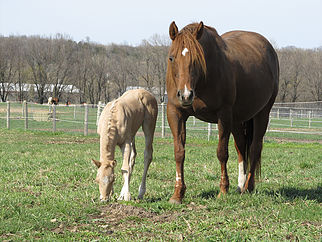We recommend planning for breeding season early – even as early as December! This will help make things as stress-free and seamless as possible.
Every year Lodi Veterinary Care rechecks mares for pregnancy, and we recommend doing this as early as January. Of the mares that are confirmed in foal at 15 days and re-confirmed in foal at 35 days, there will still be 5-10% that will have suffered embryonic loss and be open in spring.
If you do have a mare that has suffered embryonic loss, conducting diagnostic work early in the spring is a good idea, as it can take some time. Ultrasonography, uterine cultures, cytology and/or biopsies may be indicated.
Many mares have already been confirmed in foal and are either approaching or past their fifth month. Rhinopneumonitis, also known as EHV-1 (equine herpes virus 1), can cause abortion of the foal; however, there are very effective vaccines available for protection against this disease. The mare should be vaccinated at 5, 7, and 9 months of gestation. When the mare reaches her 10th month, she should receive vaccinations for eastern and western encephalitis, tetanus, West Nile virus, rabies, and influenza. Pregnant mares should have a fecal exam performed and be dewormed accordingly. The mare should also be dewormed around foaling time with an Ivermectin product to help protect her and the foal.
In order to help keep both mare and foal healthy, we advocate for a well-balanced nutrition program. When lacking in crucial vitamins and minerals, foals can suffer from deformities such as angular limb deformities and can be prone to developmental orthopedic diseases. Additionally, mares on a good balanced nutrition program have better chances of conceiving when they are re-bred following foaling. The minerals copper, zinc, phosphorus, selenium and manganese have been proven to affect fertility and must be provided at optimally balanced levels.
If your mare received a “caslicks” operation when she was either bred or confirmed in foal, don’t forget to have your veterinarian remove sutures approximately two weeks prior to foaling.
Breeding season can be a hectic time! That’s why we want too make things as easy as possible. Below is a quick checklist to make sure you and your mare are ready to go!
- Confirm your mare is in foal
- Vaccinate them against Rhinopneumonitis at 5, 7, and 9 months of gestation
- Vaccinate them for eastern and western encephalitis, tetanus, West Nile virus, rabies, and influenzaat 10 months gestation
- Practice good deworming, throughout the pregnancy
- Ensure your mare is on a well-balanced diet, complete with the necessary vitamins and minerals
And most of all, contact your veterinarian if you have any questions or concerns! We are here to ensure the health and safety of mare and foal.

